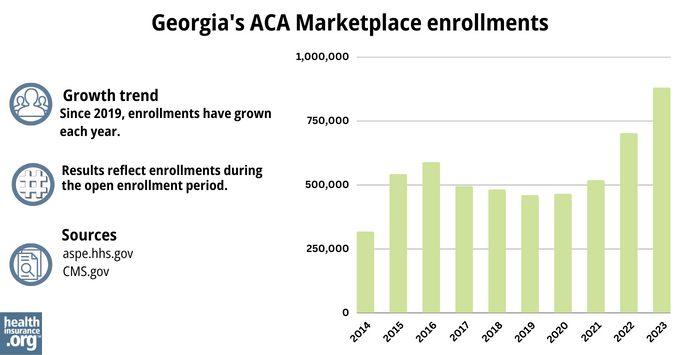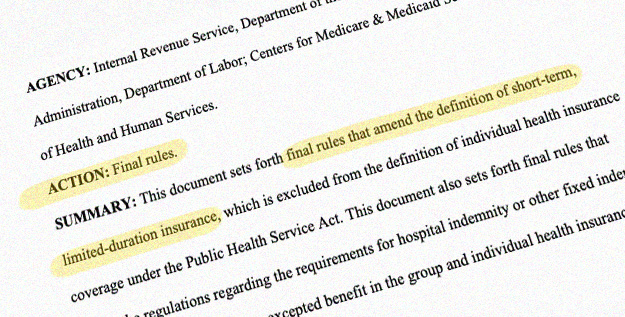Home > States > Health insurance in Georgia
See your Georgia health insurance coverage options.

Find individual and family plans, small-group, short-term or Medicare plans through licensed agency partners.

Georgia Health Insurance Consumer Guide
We created this Georgia health insurance guide the FAQs below to help you understand the health insurance options and possible financial assistance available for you and your family.
Georgia’s ACA Marketplace (exchange) is a platform where a variety of private health insurers offer health insurance for people who need to buy their own individual or family health coverage. This includes people who don’t qualify for Medicare or Medicaid, and also don’t have an offer of health insurance from an employer.
Depending on your income and other circumstances, you may be eligible for financial assistance that will reduce your monthly insurance premium (the amount you pay to enroll in the coverage) and possibly your out-of-pocket expenses. These subsidies are currently available in Georgia through HealthCare.gov, which is the federally-run Marketplace. They will be available through Georgia’s state-run Marketplace once it debuts in the fall of 2024.
Explore our other comprehensive guides to coverage in Georgia
Dental coverage in Georgia

Looking to improve your smile and save some money when you go to the dentist? Adding dental coverage, in addition to your health coverage, might be a wise choice. Our guide explores dental coverage options in Georgia.

Georgia’s Medicaid program

Nearly 2.5 million Georgia residents were enrolled in Medicaid and CHIP (PeachCare for Kids) as of 2023.1 After being paused for three years due to the pandemic, Medicaid disenrollments resumed in Georgia in May 2023. By July 2023, more than 173,000 Georgia residents had been disenrolled from Medicaid.2

Medicare coverage and enrollment in Georgia

As of 2023, nearly 1.9 million Georgia residents were enrolled in Medicare.3 Our Georgia Medicare guide explains what you need to know about Medicare and Medigap plans in the state.

Short-term coverage in Georgia

Georgia allows short-term health plans to follow federal duration rules, and at least nine insurers currently market short-term health insurance in Georgia.4

Frequently asked questions about health insurance in Georgia
Who can buy Marketplace health insurance?
To enroll in private health coverage through the Marketplace in Georgia, you must:5
- Be a resident of Georgia
- Be lawfully present in the United States
- Not be incarcerated
- Not have Medicare coverage
Those are the only qualifications you need to meet in order to enroll in a Marketplace plan, but qualifying for financial assistance (premium subsidies and cost-sharing reductions) is a little different, and does have some additional parameters.
Eligibility for Marketplace financial assistance depends on your income and how it compares with the cost of the second-lowest-cost Silver plan in your area. In addition, to qualify for Marketplace financial assistance you must:
- Not have access to affordable employer-sponsored health coverage. If your employer offers coverage but you feel it’s too expensive, you can use our Employer Health Plan Affordability Calculator to see if you might qualify for premium subsidies in the Marketplace.
- Not be eligible for Medicaid or PeachCare for Kids (Georgia CHIP).
- Not be eligible for premium-free Medicare Part A.6
When can I enroll in an ACA-compliant health plan in Georgia?
You can sign up for an ACA-compliant individual or family health plan in Georgia between November 1 and January 15. This is the annual open enrollment period.
For coverage to start on January 1, you must make your plan selection by December 15. If you apply between December 16 and January 15, your coverage will take effect on February 1.7
After the annual open enrollment period ends, your opportunity to enroll or make a plan change will be limited. It’s generally only available if you experience a qualifying life event, such as giving birth or losing other health. But some people can enroll year-round even without a specific qualifying life event.8
Enrollment in Georgia Medicaid and PeachCare for Kids (CHIP) is available year-round, so if you’re eligible for either of these programs, you can enroll anytime.
How do I enroll in a Marketplace plan in Georgia?
In Georgia, you can sign up for ACA Marketplace coverage through HealthCare.gov. This is the federally run Marketplace platform, and Georgia will continue to use it for all coverage effective in 2024.
But starting in the fall of 2024, for coverage effective in 2025, Georgia will be operating its own fully state-run exchange. Georgia had intended to make this transition in the fall of 2023, but the federal government pushed that out by a year.9
To enroll in an ACA Marketplace plan in Georgia, you can:
- Visit HealthCare.gov, which is Georgia’s health insurance Marketplace. HealthCare.gov provides an online platform where you can compare the available plans, determine your eligibility for financial assistance, and enroll in the coverage that best meets your needs. (Starting in the fall of 2024, Georgia will no longer use HealthCare.gov and will instead have a state-run Marketplace platform.)
- Purchase individual and family health coverage with the help of an insurance agent or broker, a Navigator or certified application counselor, or an approved enhanced direct enrollment entity.10
You can reach HealthCare.gov’s call center by dialing 1-800-318-2596 (TTY: 1-855-889-4325). The call center is available 24 hours a day, seven days a week, but it’s closed on holidays.
How can I find affordable health insurance in Georgia?
You may find affordable health insurance options in Georgia by enrolling in a plan through HealthCare.gov – especially if you’re eligible for financial assistance.
Income-based subsidies called Advance Premium Tax Credits (APTC) are available as a result of the Affordable Care Act. APTCs can help lower your premium payments each month, and most enrollees are eligible for these subsidies.
As of 2023, 94% of Marketplace enrollees in Georgia were receiving premium subsidies that saved them an average of nearly $487 /month. After subsidies were applied, the average enrollee’s monthly cost was about $66/month.11

Source: CMS.gov11
Although most Georgia Marketplace enrollees are eligible for premium subsidies, the state’s reinsurance program, which took effect in 2022, helps to keep premiums lower than they would otherwise be for people who aren’t subsidy-eligible.12
If your household income isn’t more than 250% of the federal poverty level, you may also qualify for cost-sharing reductions (CSR), which are another type of ACA subsidy. These subsidies can lower your deductibles and out-of-pocket expenses as long as you select a Silver-level plan. Sixty-three percent of Georgia’s Marketplace enrollees were receiving CSR benefits as of 2023.13
Depending on your income and circumstances, you may find that you’re eligible for free or low-cost health coverage through Medicaid or PeachCare for Kids (Georgia CHIP).
Georgia partially expanded Medicaid in mid-2023 (up to 100% of the poverty level) but imposed a work requirement for eligibility. This has significantly limited the number of people who are newly eligible for coverage under the program, which is called Georgia Pathways to Coverage. As of December 2023, only 2,344 people were enrolled in the Pathways program.14
Learn more about whether you might meet the criteria for Medicaid in Georgia.
How many insurers offer Marketplace coverage in Georgia?
Nine private insurers offer health coverage through the Georgia exchange in 2024, with varying coverage areas.15
There were eleven insurers in Georgia’s exchange in 2022, but Bright Health stopped offering coverage after the end of 2022. Friday Health Plans stopped offering coverage in the spring of 2023 and their existing policies terminated on July 31, 2023.16
Are Marketplace health insurance premiums increasing in Georgia?
For 2024, Georgia’s insurers implemented the following average rate changes,17 amounting to a weighted average rate increase of 17.4% before any subsidies are applied.18
Georgia’s ACA Marketplace Plan 2024 Approved Rate Increases by Insurance Company |
|
|---|---|
| Issuer | Percent Increase |
| Alliant | 19.5% |
| Ambetter from Peach State Health Plan (Centene) | 9.08% |
| Anthem Blue Cross and Blue Shield | 12.86% |
| CareSource | 12.31% |
| Cigna | 39.87% |
| Aetna | 18.02% |
| Kaiser | 11.6% |
| Oscar | 8.51% |
| UnitedHealthcare | 6.35% |
Average rate increases are for full-price plans, but 94% of Georgia Marketplace enrollees are receiving premium tax credits that help reduce their monthly payments.19
Subsidy amounts change each year to keep pace with changes in the benchmark plan (the second-lowest-cost Silver plan) in each area. As a result of the American Rescue Plan, the subsidies are larger than they used to be, and available to more people. And this will continue to be the case through 2025, due to the Inflation Reduction Act.
If the cost of your current plan increases, you can explore other plans in the exchange that may be less expensive and offer similar benefits. Plan changes are possible during open enrollment, or with certain qualifying life events.
For perspective, here’s a summary of how average rates have changed over the years for Georgia’s ACA-compliant individual/family market:
- 2015: Average increase of 1%.20
- 2016: Average increase of 10.3%.21
- 2017: Average increase of 32.8%.22
- 2018: Average increase of 54.2%. 23 (federal funding for cost-sharing reductions was eliminated)
- 2019: Average increase of 3.9%.24
- 2020: Average decrease of 0.9%.25
- 2021: Average increase of 4.8%.26
- 2022: Average decrease of 2.2%.27
- 2023: Average increase of 10.1%.28
How many people are insured through the Georgia Marketplace?
During the open enrollment period for 2024 coverage, 1,305,114 people enrolled in private plans through Georgia’s health insurance Marketplace.29
That was a significant record high, and it came on the heels of the previous record high, when 879,084 people enrolled the year before, for 2023 coverage.30
This chart shows Georgia’s Marketplace enrollment over time. For several years, it hovered a little above or a little below 500,000 people, but has increased drastically in the last few years.
The increase is driven in large part by the enhanced premium subsidies created by the American Rescue Plan and the Inflation Reduction Act. And the additional enrollment growth for 2024 is also driven by the fact that people are once again being disenrolled from Medicaid, after that was paused for three years during the pandemic. Some of the people disenrolled from Georiga Medicaid have transitioned to Marketplace coverage.

Source: 2014,31 2015,32 2016,33 2017,34 2018,35 2019,36 2020,37 2021,38 2022,39 202330
What health insurance resources are available to Georgia residents?
HealthCare.gov: The Marketplace in Georgia, where residents can enroll in individual/family health coverage and receive income-based subsidies. You can reach HealthCare.gov at 800-318-2596. (Note that Georgia will no longer use HealthCare.gov as of the 2025 plan year, so when open enrollment begins in November 2024, Georgia residents will be using a new enrollment platform.)
Georgia Department of Community Health (DCH) – Administers Georgia Medicaid and PeachCare for Kids.
Georgia Office of Insurance and Safety Fire Commissioner – Regulates and licenses health insurance products sold in the state, as well as the brokers and agents who sell them.
Georgia’s three federally funded Navigator organizations help people enroll in coverage (private health plans or Medicaid) in the exchange:40
- Georgia Association for Primary Health Care, Inc. (GAPHC)
- Georgia Legal Services Program
- St. Joseph’s Mercy Care Services
Georgia Cares State Health Insurance Assistance Program – A resource for Medicare beneficiaries and their caregivers, providing counseling and assistance with various Medicare issues.
Louise Norris is an individual health insurance broker who has been writing about health insurance and health reform since 2006. She has written dozens of opinions and educational pieces about the Affordable Care Act for healthinsurance.org.
Footnotes
- “May 2023 Medicaid & CHIP Enrollment Data Highlights” Medicaid.gov, Accessed August 2023 ⤶
- “Medicaid Enrollment and Unwinding Tracker” KFF.org, Aug. 30, 2023 ⤶
- “Medicare Monthly Enrollment” CMS.gov, April 2023 ⤶
- “Availability of short-term health insurance in Georgia” healthinsurance.org, Feb. 28, 2023 ⤶
- ”A quick guide to the Health Insurance Marketplace” HealthCare.gov ⤶
- Medicare and the Marketplace, Master FAQ. Centers for Medicare and Medicaid Services. Accessed November 2023. ⤶
- “A quick guide to the Health Insurance Marketplace®” HealthCare.gov, Accessed August, 2023 ⤶
- “Who doesn’t need a special enrollment period?“ healthinsurance.org, Accessed August 2023 ⤶
- ”Georgia Marketplace Conditional Approval Letter” Centers for Medicare and Medicaid Services. July 27, 2023 ⤶
- ”Entities Approved to Use Enhanced Direct Enrollment” CMS.gov, April 28, 2023 ⤶
- “2023 OEP State-Level Public Use File” CMS.gov, March 23, 2023 ⤶ ⤶
- Georgia: State Innovation Waiver under section 1332 of the PPACA. Centers for Medicare and Medicaid Services. November 1, 2020. ⤶
- “Effectuated Enrollment: Early 2023 Snapshot and Full Year 2022 Average” CMS.gov, March 15, 2023 ⤶
- Pathways Monitoring Reports, December 15, 2023. Georgia Department of Community Health. Accessed January 2024. ⤶
- “Georgia Rate Review Submissions” HealthCare.gov, Accessed August 2023 ⤶
- “Important Announcement Regarding Friday Health Plans of Georgia, Inc.” Georgia.gov, May 31, 2023 ⤶
- “Georgia Rate Review Submissions” HealthCare.gov, Accessed November 2023 ⤶
- Georgia: Final Avg. Unsubsidized 2024 #ACA Rate Changes: +17.4%. ACA Signups. August 2023. ⤶
- “Effectuated Enrollment: Early 2023 Snapshot and Full Year 2022 Average” CMS.gov, March 15, 2023 ⤶
- Analysis Finds No Nationwide Increase in Health Insurance Marketplace Premiums. The Commonwealth Fund. December 2014. ⤶
- FINAL PROJECTION: 2016 Weighted Avg. Rate Increases: 12-13% Nationally* ACA Signups. October 2015. ⤶
- Avg. UNSUBSIDIZED Indy Mkt Rate Hikes: 25% (49 States + DC). ACA Signups. October 2016. ⤶
- 2018 Rate Hikes. ACA Signups. October 2017. ⤶
- Georgia: APPROVED 2019 #ACA Rate Hikes: 3.9%…Would Likely Have DROPPED ~8% Without #ACASabotage. ACA Signups. August 2018. ⤶
- Georgia: *Final* Avg. 2020 #ACA Premiums Rate Change: 0.9% Decrease. ACA Signups. October 2019. ⤶
- Georgia: Approved Avg. 2021 #ACA Premiums: +4.8% (Was -1.3%). ACA Signups. September 2020. ⤶
- 2022 Rate Changes. ACA Signups. October 2021. ⤶
- UPDATED: FINAL Unsubsidized 2023 Premiums: +6.2% Across All 50 States +DC. ACA Signups. Accessed November 2023. ⤶
- Marketplace 2024 Open Enrollment Period Report: Final National Snapshot. Centers for Medicare and Medicaid Services. January 2024. ⤶
- “Health Insurance Marketplaces 2023 Open Enrollment Report” CMS.gov, 2023 ⤶ ⤶
- “ASPE Issue Brief (2014)” ASPE, 2015 ⤶
- “Health Insurance Marketplaces 2015 Open Enrollment Period: March Enrollment Report”, HHS.gov, 2015 ⤶
- “HEALTH INSURANCE MARKETPLACES 2016 OPEN ENROLLMENT PERIOD: FINAL ENROLLMENT REPORT” HHS.gov, 2016 ⤶
- “2017 Marketplace Open Enrollment Period Public Use Files” CMS.gov, 2017 ⤶
- “2018 Marketplace Open Enrollment Period Public Use Files” CMS.gov, 2018 ⤶
- “2019 Marketplace Open Enrollment Period Public Use Files” CMS.gov, 2019 ⤶
- “2020 Marketplace Open Enrollment Period Public Use Files” CMS.gov, 2020 ⤶
- “2021 Marketplace Open Enrollment Period Public Use Files” CMS.gov, 2021 ⤶
- “2022 Marketplace Open Enrollment Period Public Use Files” CMS.gov, 2022 ⤶
- “2022 CMS Navigator Cooperative Agreement Awardees” CMS.gov, Accessed August 2023 ⤶







